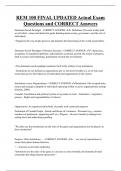REM 100 FINAL UPDATED Actual Exam
Questions and CORRECT Answers
Dominant Social Paradigm - CORRECT ANSWER- ✔✔• Definition: The most widely held
set of beliefs, values and ideals that guide thinking about society, governance, and the role of
individuals.
• Organizes the way people perceive and interpret the functioning of the world around them.
Dominant Social Paradigm of Western Societies - CORRECT ANSWER- ✔✔- democracy,
acceptance of regulated capitalism, individualism, economic growth, the notion of progress,
faith in science and technology, domination towards the environment
• The dominant social paradigm manifests itself in the totality of our institutions.
- Institutions are not defined as organizations per se, but more broadly as a set of rules and
norms that govern the behaviour of individuals and organizations in the system.
Institutions versus Organizations - CORRECT ANSWER- ✔✔Institution: The accepted rules,
norms and strategies adopted by individuals operating within or across organizational settings
(Ostrom, 2008).
Canada's Constitution and political system set up under its term - Federalism - Legislative
process - Rights and responsibilities of citizens
Organization: An organized entity/body of people with a particular purpose
Parliament of Canada People - Senate and House of Commons - Personnel (e.g., senators,
members of parliament, supporting staff, etc.) Purpose - Govern Canada by making laws,
setting taxes and authorizing spending
"We often say that institutions are the rules of the game and organizations are the players in
these institutions"
Purpose / Role Institutions ... - CORRECT ANSWER- ✔✔• ... are sets of expectations or
norms that pattern human behavior.
• ... structure social order (authority).
"Institutions are the rules of the game in a society or, more formally, the humanly devised
constraints that shape human interactions."
,Key Characteristics
• Can be formal and/or informal (can be imposed or emerge from society itself)
Example of Written Institutions
Canada's Constitution Act, 1982 Relevance to REM: Federal and provincial governments are
granted different legislative jurisdiction over natural resources and the environment
Institutional and Financial Arrangements for Intern. Environ. Cooperation
• Established in 1972 after the UN Conference on Human Environment (Stockholm
Conference) • Foundation for UNEP, a global environ. authority that has overall
responsibility for environmental programs among United Nations agencies
• Has aided guidelines and treaties on issues such as international trade of potentially harmful
chemicals, transboundary air pollution, and contamination of international waterways.
• Together with the WMO, the UNEP established the Intergovernmental Panel on Climate
Change (IPCC)
• Talks on climate change are overseen by the UN Framework Convention on Climate
Change (UNFCCC)
Examples of Informal/Unwritten Institutions
• Informal rules among a group of resource users (e.g., fishermen)
• Culturally appropriate behaviour
• Informal rules among a group of resource users (e.g., fishermen)
• Culturally appropriate behaviour
Components of Economic System - CORRECT ANSWER- ✔✔"[W]e often say that
institutions are the rules of the game and organizations are the players in these institutions."
Organizations
- Businesses
- Buyers
- Producers
- Customers
- Sellers
,Institutions
- Rules that determine how these players interact
Economics = is the social science that seeks to describe the factors which determine the
production, distribution and consumption of goods and services.
Environmental economics - CORRECT ANSWER- ✔✔is a sub-field of economics that is
concerned with environmental issues.
• Market failures
• Measures of prosperity/development
• Ecosystem services
• Economic approaches to sustainability
Dominant Economic Paradigm: - CORRECT ANSWER- ✔✔Free-Market Economy
An economic system ...
• where prices for goods and services are set freely by the forces of supply and demand and
are allowed to reach their point of equilibrium without intervention by government policy.
• that typically entails support for private ownership of productive enterprises and highly
competitive markets.
A market is a medium that allows buyers and sellers of a specific good or service to interact
in order to facilitate exchange (e.g., farmers market, housing market, stock exchange).
In a free market, the transactions between buyers (consumers) and sellers (producers) are
driven by the relationship between supply and demand.
Supplier = Given a market price for tomatoes, how many am I willing to produce?
Initial Price > PriceEqu - CORRECT ANSWER- ✔✔• Surplus • Supplier unhappy • Price
goes down • Quantity demanded increases • Quantity supplied decreases • Reach equilibrium
price
, Initial Price < PriceEqu - CORRECT ANSWER- ✔✔• Shortage • Buyers unhappy • Price is
pushed up • Quantity demanded decreases • Quantity supplied increases • Reach equilibrium
price
Some of the requirements for a free market: - CORRECT ANSWER- ✔✔• Large number of
buyers and sellers
• Perfect information about current and future prices, products available, etc.
• All economic agents behave rationally; producers maximize profits and consumers
maximize their satisfaction or "utility"
• Market prices reflect full costs of production and consumption
• Inputs being supplied and goods being produced are individually owned and divisible
Benefit of Free Market - CORRECT ANSWER- ✔✔"In principle, markets provide us with an
extraordinarily efficient mechanism for allocating society's limited productive capacity - its
stock of productive resources, including labour, capital, technology, and natural resources - to
their most highly valued uses."
Price plays an important role in the free market: - CORRECT ANSWER- ✔✔•
Communicates information about scarcity of a good
• Incentivizes behavior that tends to make the most productive use of the available scarce
resources.
Invisible hand: Individuals' efforts to pursue their own interest may [magically] result in
benefit for the society better than if you explicitly planned for it.
Ownership of Property 4 To own: - CORRECT ANSWER- ✔✔To have or hold as one's own;
to belong to one, be the proprietor of, possess.
Several tests:
• Property has value (implies scarcity)
• Property is definable / controllable
• Others can be excluded from its use or enjoyment
Ownership implies following rights: - CORRECT ANSWER- ✔✔• to use or 'enjoy' the
property (access & withdrawal)




